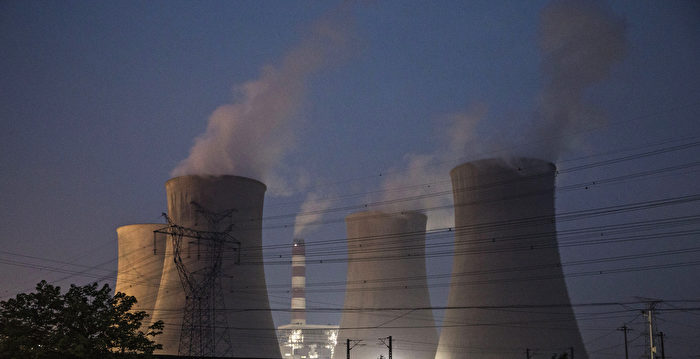[Epoch Times September 28, 2021](Epoch Times reporter Li Yan comprehensive report) In order to achieve “dual control of energy consumption”, many places in China have “switched on and curtailed power,” highlighting the increasing energy pressure facing the mainland. The Northeast Industrial Zone, which is most severely affected by the power contraction, said it urgently needs to increase coal imports to maintain lighting, water use, and factory operations.
Beginning in early September, the CCP’s “dual energy consumption control” has suddenly been upgraded. Enterprises in many provinces and regions have successively received notices of mandatory power curtailment, production restriction, and production suspension. And so on, it may even continue until the end of the year.
Since last week, many parts of Northeast China have implemented power rationing during peak hours. News from news organizations and social media said that due to “power cuts”, the northeastern region was forced to turn off traffic lights; elevators in residential buildings were out of service; mobile 3G networks were shut down and factories had to shut down.
Reuters reported that the lack of electricity caused by coal shortages paralyzed a large number of industrial sectors. Cities such as Shenyang and Dalian, which have a population of 13 million, have also been affected. The factories of suppliers of multinational companies such as Apple and Tesla have been shut down.
The governor of Jilin Province, the most affected province, called for increased purchases of imported coal; an association of electric power companies said it was expanding coal supply “at all costs.”
Goldman Sachs estimates that as many as 44% of China’s industrial activities are hit by power shortages, which may cause the annualized GDP growth rate to drop by one percentage point in the third quarter and two percentage points from October to December.
In a note on Tuesday, the American multinational investment bank and financial services company headquartered in Manhattan, New York, said it lowered China’s 2021 GDP growth forecast to 7.8% from the previous 8.2%.
Coal business: finding new sources of coal imports is not easy
Jilin Xinbei Water Affairs Co., Ltd. issued an announcement on September 26, 2021, stating that in accordance with the requirements of relevant departments, there will be irregular, irregular, unplanned, and unannounced power cuts. In the next six months, power outages and water outages have become the norm. The statement immediately caused market panic, and the company immediately admitted through the WeChat official account that the wording of the notice previously issued was inappropriate.
Jilin Province has a population of nearly 25 million. The governor Han Jun told the power company on Monday (September 27) that “multiple channels” need to be established to ensure coal supply. China should buy more coal from Russia, Mongolia and Indonesia. At the same time, local people “overcome” the difficulties caused by rising coal prices.
Due to the “cutting the power supply”, some shops in the northeast are open by candlelight; shopping malls are closed in advance. A post from Weibo warns users that water cuts may happen at any time.
The China Electricity Council (CEC), which represents power suppliers, has called for an increase in domestic coal production and supply and the signing of more mid- and long-term contracts to increase power plant inventories before winter arrives.
Coal merchants say it’s easier said than done-finding new sources of coal imports may not be easy.
“Russia must first meet the needs of Europe, Japan and South Korea.” A coal business from the northeast said, “Indonesia’s export transportation has been blocked by the rainy weather in the past few months; Mongolia’s (coal) exports are mainly through trucks. The scale is very small.”
China’s thermal coal futures hit a record high
After the CCP restricted the entry of Australian coal in retaliation, the CCP purchased coal from all over the world, causing coal prices to soar.
The media reported earlier in June that Rory Simington, an analyst at Wood Mackenzie’s energy research and consulting firm, said that it is difficult for Chinese importers to find alternatives to high-quality coal such as Australian coal. “One thing is certain. Compared with other regions where Australian coal can be purchased, Chinese consumers are paying more for coal.”
Chinese thermal coal futures hit a record high of 1,330 yuan (US$205.68) per ton on Tuesday.
The CCP’s restrictions on Australian coal imports have led to the abnormal development of the coal market. Simington, for example, said that the price of Russian coal recently purchased by consumers in southern China exceeded the price of similar Australian coal by nearly 50%, while the price of a type of Indonesian coal exceeded the price of Australian coal, but its calorific value was nearly 20% lower than that of Australian coal.
In November last year (2020), the CCP began to restrict the entry of Australian coal. According to data from the Australian Department of Trade, Australia’s coal exports to China have fallen from about A$1 billion per month to about A$30 million. Subsequently, most of Australia’s coal found new markets in Indonesia, Vietnam, Japan and South Korea. Moreover, coal prices have risen recently.
In April last year, Australian Prime Minister Scott Morrison took the lead in calling for an independent investigation of the origin of the CCP virus (Wuhan pneumonia), which annoyed the CCP. The CCP therefore implemented extensive trade retaliatory measures against Australia, affecting barley, beef, and coal.
Editor in charge: Lin Yan#
.
